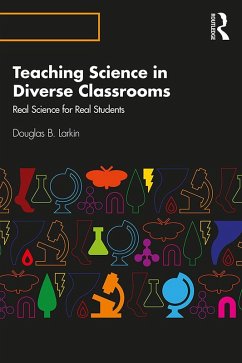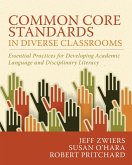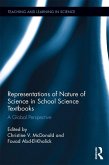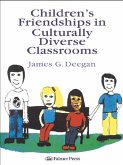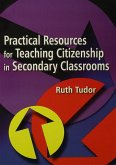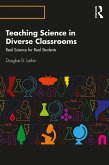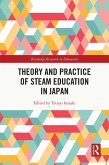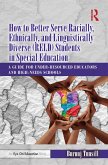42,95 €
42,95 €
inkl. MwSt.
Sofort per Download lieferbar

21 °P sammeln
42,95 €
Als Download kaufen

42,95 €
inkl. MwSt.
Sofort per Download lieferbar

21 °P sammeln
Jetzt verschenken
Alle Infos zum eBook verschenken
42,95 €
inkl. MwSt.
Sofort per Download lieferbar
Alle Infos zum eBook verschenken

21 °P sammeln
- Format: PDF
- Merkliste
- Auf die Merkliste
- Bewerten Bewerten
- Teilen
- Produkt teilen
- Produkterinnerung
- Produkterinnerung

Bitte loggen Sie sich zunächst in Ihr Kundenkonto ein oder registrieren Sie sich bei
bücher.de, um das eBook-Abo tolino select nutzen zu können.
Hier können Sie sich einloggen
Hier können Sie sich einloggen
Sie sind bereits eingeloggt. Klicken Sie auf 2. tolino select Abo, um fortzufahren.

Bitte loggen Sie sich zunächst in Ihr Kundenkonto ein oder registrieren Sie sich bei bücher.de, um das eBook-Abo tolino select nutzen zu können.
This book offers science teachers a new way of thinking by drawing on research that explores new methods to make science accessible to K-12 students. Through engaging anecdotes, Larkin empathizes the challenges faced by science teachers, and presents a clear pathway to successful, inspiring, and culturally relevant science teaching.
- Geräte: PC
- ohne Kopierschutz
- eBook Hilfe
- Größe: 2.6MB
Andere Kunden interessierten sich auch für
![Common Core Standards in Diverse Classrooms (eBook, PDF) Common Core Standards in Diverse Classrooms (eBook, PDF)]() Jeff ZwiersCommon Core Standards in Diverse Classrooms (eBook, PDF)30,95 €
Jeff ZwiersCommon Core Standards in Diverse Classrooms (eBook, PDF)30,95 €![Representations of Nature of Science in School Science Textbooks (eBook, PDF) Representations of Nature of Science in School Science Textbooks (eBook, PDF)]() Representations of Nature of Science in School Science Textbooks (eBook, PDF)43,95 €
Representations of Nature of Science in School Science Textbooks (eBook, PDF)43,95 €![Children's Friendships In Culturally Diverse Classrooms (eBook, PDF) Children's Friendships In Culturally Diverse Classrooms (eBook, PDF)]() James G. DeeganChildren's Friendships In Culturally Diverse Classrooms (eBook, PDF)52,95 €
James G. DeeganChildren's Friendships In Culturally Diverse Classrooms (eBook, PDF)52,95 €![Practical Resources for Teaching Citizenship in Secondary Classrooms (eBook, PDF) Practical Resources for Teaching Citizenship in Secondary Classrooms (eBook, PDF)]() Ruth TudorPractical Resources for Teaching Citizenship in Secondary Classrooms (eBook, PDF)33,95 €
Ruth TudorPractical Resources for Teaching Citizenship in Secondary Classrooms (eBook, PDF)33,95 €![Teaching Science in Diverse Classrooms (eBook, ePUB) Teaching Science in Diverse Classrooms (eBook, ePUB)]() Douglas B. LarkinTeaching Science in Diverse Classrooms (eBook, ePUB)42,95 €
Douglas B. LarkinTeaching Science in Diverse Classrooms (eBook, ePUB)42,95 €![Theory and Practice of STEAM Education in Japan (eBook, PDF) Theory and Practice of STEAM Education in Japan (eBook, PDF)]() Theory and Practice of STEAM Education in Japan (eBook, PDF)42,95 €
Theory and Practice of STEAM Education in Japan (eBook, PDF)42,95 €![How to Better Serve Racially, Ethnically, and Linguistically Diverse (RELD) Students in Special Education (eBook, PDF) How to Better Serve Racially, Ethnically, and Linguistically Diverse (RELD) Students in Special Education (eBook, PDF)]() Buruuj TunsillHow to Better Serve Racially, Ethnically, and Linguistically Diverse (RELD) Students in Special Education (eBook, PDF)28,95 €
Buruuj TunsillHow to Better Serve Racially, Ethnically, and Linguistically Diverse (RELD) Students in Special Education (eBook, PDF)28,95 €-
-
-
This book offers science teachers a new way of thinking by drawing on research that explores new methods to make science accessible to K-12 students. Through engaging anecdotes, Larkin empathizes the challenges faced by science teachers, and presents a clear pathway to successful, inspiring, and culturally relevant science teaching.
Dieser Download kann aus rechtlichen Gründen nur mit Rechnungsadresse in A, B, BG, CY, CZ, D, DK, EW, E, FIN, F, GR, HR, H, IRL, I, LT, L, LR, M, NL, PL, P, R, S, SLO, SK ausgeliefert werden.
Produktdetails
- Produktdetails
- Verlag: Taylor & Francis eBooks
- Seitenzahl: 144
- Erscheinungstermin: 29. August 2019
- Englisch
- ISBN-13: 9780429578496
- Artikelnr.: 57595829
- Verlag: Taylor & Francis eBooks
- Seitenzahl: 144
- Erscheinungstermin: 29. August 2019
- Englisch
- ISBN-13: 9780429578496
- Artikelnr.: 57595829
- Herstellerkennzeichnung Die Herstellerinformationen sind derzeit nicht verfügbar.
Douglas B. Larkin is an Associate Professor in the Department of Teaching and Learning at Montclair State University. He has worked as a high school science teacher and educator in New Jersey, Wisconsin, Kenya, and Papua New Guinea. His research examines science teacher preparation and retention, as well as issues of equity and justice in teacher education.
Acknowledgments
Introduction: Teaching Real Science to Real Students: On Being a Thoughtful
Science Teacher and Doing a Good Job
PART I Student Ideas Are the Raw Material of Our Work
1 Aiming for Culturally Relevant Science Teaching: An Argument for Meeting
Our Students Where They Are
2 Eliciting Students' Ideas: Student Ideas as the Raw Material of Science
Teachers' Work
3 Every Misconception a Shiny Pebble: Glimpsing Beautiful and Productive
Extensions of Prior Knowledge
4 Responding to Student Questions Without Giving Answers: "Maybe it Will
Just Have to Remain a Mystery Forever"
PART II Real Science, Real Students
5 HeLa Cells, High-speed Chases, and Other Essential Questions: Because
Science Class Should Not Be a Trivia Game
6 Reconsidering Labs and Demonstrations for Model-Based Inquiry: Don't
Throw Away Those Owl Pellets Just Yet
7 What if the Stork Carried 20-sided Dice? On the Use of Models and
Simulations as Tools for Thinking
8 Eyes Like a Scientist: Framing Safety as Part of Scientific Practice for
Students
9 In Praise of Field Trips and Guest Speakers: Bringing the Inside-Out and
the Outside-In for Science Learning
10 "Before Today I was Afraid of Trees": Rethinking Nature Deficit Disorder
in Diverse Classrooms
PART III Science Teacher Learning
11 Observing Candles and Classrooms: Learning from Other Teachers by
Withholding Judgment
12 Mentoring New Science Teachers: Novices Get Better When We Support Them
with Good Feedback
13 The Black Belt Science Teacher: Differentiation and a Speculative
Learning Progression for Science Teachers
14 Teaching at the Boundaries of Our Knowledge: Being Knowledgeable Enough
About What We Teach to Not Feel Like a Fraud
15 Playing School vs. Doing Science: Providing All Students with Access to
the Means of Knowledge Generation
Afterword: Good Reasons for Becoming a Science Teacher
Introduction: Teaching Real Science to Real Students: On Being a Thoughtful
Science Teacher and Doing a Good Job
PART I Student Ideas Are the Raw Material of Our Work
1 Aiming for Culturally Relevant Science Teaching: An Argument for Meeting
Our Students Where They Are
2 Eliciting Students' Ideas: Student Ideas as the Raw Material of Science
Teachers' Work
3 Every Misconception a Shiny Pebble: Glimpsing Beautiful and Productive
Extensions of Prior Knowledge
4 Responding to Student Questions Without Giving Answers: "Maybe it Will
Just Have to Remain a Mystery Forever"
PART II Real Science, Real Students
5 HeLa Cells, High-speed Chases, and Other Essential Questions: Because
Science Class Should Not Be a Trivia Game
6 Reconsidering Labs and Demonstrations for Model-Based Inquiry: Don't
Throw Away Those Owl Pellets Just Yet
7 What if the Stork Carried 20-sided Dice? On the Use of Models and
Simulations as Tools for Thinking
8 Eyes Like a Scientist: Framing Safety as Part of Scientific Practice for
Students
9 In Praise of Field Trips and Guest Speakers: Bringing the Inside-Out and
the Outside-In for Science Learning
10 "Before Today I was Afraid of Trees": Rethinking Nature Deficit Disorder
in Diverse Classrooms
PART III Science Teacher Learning
11 Observing Candles and Classrooms: Learning from Other Teachers by
Withholding Judgment
12 Mentoring New Science Teachers: Novices Get Better When We Support Them
with Good Feedback
13 The Black Belt Science Teacher: Differentiation and a Speculative
Learning Progression for Science Teachers
14 Teaching at the Boundaries of Our Knowledge: Being Knowledgeable Enough
About What We Teach to Not Feel Like a Fraud
15 Playing School vs. Doing Science: Providing All Students with Access to
the Means of Knowledge Generation
Afterword: Good Reasons for Becoming a Science Teacher
Acknowledgments
Introduction: Teaching Real Science to Real Students: On Being a Thoughtful
Science Teacher and Doing a Good Job
PART I Student Ideas Are the Raw Material of Our Work
1 Aiming for Culturally Relevant Science Teaching: An Argument for Meeting
Our Students Where They Are
2 Eliciting Students' Ideas: Student Ideas as the Raw Material of Science
Teachers' Work
3 Every Misconception a Shiny Pebble: Glimpsing Beautiful and Productive
Extensions of Prior Knowledge
4 Responding to Student Questions Without Giving Answers: "Maybe it Will
Just Have to Remain a Mystery Forever"
PART II Real Science, Real Students
5 HeLa Cells, High-speed Chases, and Other Essential Questions: Because
Science Class Should Not Be a Trivia Game
6 Reconsidering Labs and Demonstrations for Model-Based Inquiry: Don't
Throw Away Those Owl Pellets Just Yet
7 What if the Stork Carried 20-sided Dice? On the Use of Models and
Simulations as Tools for Thinking
8 Eyes Like a Scientist: Framing Safety as Part of Scientific Practice for
Students
9 In Praise of Field Trips and Guest Speakers: Bringing the Inside-Out and
the Outside-In for Science Learning
10 "Before Today I was Afraid of Trees": Rethinking Nature Deficit Disorder
in Diverse Classrooms
PART III Science Teacher Learning
11 Observing Candles and Classrooms: Learning from Other Teachers by
Withholding Judgment
12 Mentoring New Science Teachers: Novices Get Better When We Support Them
with Good Feedback
13 The Black Belt Science Teacher: Differentiation and a Speculative
Learning Progression for Science Teachers
14 Teaching at the Boundaries of Our Knowledge: Being Knowledgeable Enough
About What We Teach to Not Feel Like a Fraud
15 Playing School vs. Doing Science: Providing All Students with Access to
the Means of Knowledge Generation
Afterword: Good Reasons for Becoming a Science Teacher
Introduction: Teaching Real Science to Real Students: On Being a Thoughtful
Science Teacher and Doing a Good Job
PART I Student Ideas Are the Raw Material of Our Work
1 Aiming for Culturally Relevant Science Teaching: An Argument for Meeting
Our Students Where They Are
2 Eliciting Students' Ideas: Student Ideas as the Raw Material of Science
Teachers' Work
3 Every Misconception a Shiny Pebble: Glimpsing Beautiful and Productive
Extensions of Prior Knowledge
4 Responding to Student Questions Without Giving Answers: "Maybe it Will
Just Have to Remain a Mystery Forever"
PART II Real Science, Real Students
5 HeLa Cells, High-speed Chases, and Other Essential Questions: Because
Science Class Should Not Be a Trivia Game
6 Reconsidering Labs and Demonstrations for Model-Based Inquiry: Don't
Throw Away Those Owl Pellets Just Yet
7 What if the Stork Carried 20-sided Dice? On the Use of Models and
Simulations as Tools for Thinking
8 Eyes Like a Scientist: Framing Safety as Part of Scientific Practice for
Students
9 In Praise of Field Trips and Guest Speakers: Bringing the Inside-Out and
the Outside-In for Science Learning
10 "Before Today I was Afraid of Trees": Rethinking Nature Deficit Disorder
in Diverse Classrooms
PART III Science Teacher Learning
11 Observing Candles and Classrooms: Learning from Other Teachers by
Withholding Judgment
12 Mentoring New Science Teachers: Novices Get Better When We Support Them
with Good Feedback
13 The Black Belt Science Teacher: Differentiation and a Speculative
Learning Progression for Science Teachers
14 Teaching at the Boundaries of Our Knowledge: Being Knowledgeable Enough
About What We Teach to Not Feel Like a Fraud
15 Playing School vs. Doing Science: Providing All Students with Access to
the Means of Knowledge Generation
Afterword: Good Reasons for Becoming a Science Teacher
